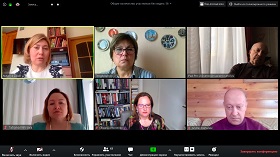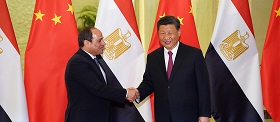The world continues to fight the spread of COVID-19, an infection of a new type. In China, the peak of the epidemic has passed; countries of the European Union and the United States cannot yet seize the strategic initiative in an unequal battle with the pandemic, despite the high level of the healthcare system. At the same time, in some states that are inferior to them in terms of economic development, the disease spreads less extensively, according to official statistics. Egypt is not an exception — a poor, densely populated North African country, whose population exceeded 100 million people in February 2020. Almost the entire population of the Arab Republic of Egypt (ARE) lives in the north of the country and concentrates in several large cities: 10 million live in Cairo, another 9 million live in Giza. That is why the outbreak of the epidemic is very dangerous, especially in poor areas of megacities.
It seems that the measures taken to combat the epidemic are a facade. Perhaps they are being implemented only so that the current leadership of Egypt does not seem too inhumane. The country does not impose universal quarantine and does not mobilize all resources to combat COVID-19 — and this inaction is largely compelled since the quarantine would inflict a powerful blow on an already weak economy. Health care infrastructure remains very fragile — Egypt struggled with the epidemics of HIV and hepatitis C. The population was dying of hunger and disease until the coronavirus pandemic. With the advent of a new misfortune, the situation became even more deplorable.
In March, the Minister of Health and Population, Hala Zayed, paid an official visit to China — she accompanied the supply of medicines. In turn, Beijing provided Egypt with technical documentation on coronavirus, as well as a thousand tests to detect virus carriers. Perhaps, the only thing that can save the Arab Republic from a large number of deaths from COVID-19 now is large-scale external assistance. In a situation where all the major players are busy solving internal problems caused by the virus, the only country that can provide Cairo with the necessary financial support and put tests for coronavirus is China. Otherwise, Egypt could become the next Bergamo.
The world continues to fight the spread of COVID-19, an infection of a new type. In China, the peak of the epidemic has passed; countries of the European Union and the United States cannot yet seize the strategic initiative in an unequal battle with the pandemic, despite the high level of the healthcare system. At the same time, in some states that are inferior to them in terms of economic development, the disease spreads less extensively, according to official statistics. Egypt is not an exception — a poor, densely populated North African country, whose population exceeded 100 million people in February 2020. Almost the entire population of the Arab Republic of Egypt (ARE) lives in the north of the country and concentrates in several large cities: 10 million live in Cairo, another 9 million live in Giza. That is why the outbreak of the epidemic is very dangerous, especially in poor areas of megacities.
The first case of COVID-19 in Egypt was recorded on February 14, 2020, making it the first confirmed case in Africa. Over the following weeks, the Egyptian authorities did not take proactive measures to prevent the spread of the epidemic. In early March, according to official Egyptian statistics, the virus had infected only three individuals.
On March 6, it became clear that official statistics did not reflect the real situation, although Egyptian President Abdel Fattah al-Sisi ordered to provide the citizens with accurate and reliable information about the coronavirus. Following this episode, there was an outbreak of COVID-19 on a cruise ship following the Nile from Aswan to Luxor: the diagnosis was confirmed for 45 people. A few days later, Egypt announced the first death related to COVID-19 when a German tourist, transported from Luxor to Hurghada, died of the virus in a hospital. Soon after, the US Centers for Disease Control and Prevention announced that they had discovered at least 60 cases in 15 states directly linked to the Nile River cruise in Egypt. There was a clear mismatch between the number of infected tourists travelling from Egypt and the incidence rate in the country. According to the official statistic, only 126 people were infected in Egypt at that time.
The problem of the spread of COVID-19 in the ARE was carefully studied in Canada: here, the diagnosis was confirmed for many tourists who had returned from Egypt, although there were few confirmed cases in the Arab Republic itself. The situation was absurd: the coronavirus was found in a tourist who arrived from Egypt, while only one case of COVID-19 infection was recorded in the ARE. Canadian scientists conducted research using the methodology used in 2009 to model the spread of the H1N1 virus. The same methodology was used to study the situation with a new type of coronavirus infection in Iran and Italy. After analyzing the number of infected tourists who returned from Egypt to their homes, the researchers made a disappointing conclusion. It was found that when the Egyptian authorities reported only three cases, the country already had from 6,270 to 45,070 cases of coronavirus infection.
The reaction of the Egyptian leadership followed immediately — soon after, the authorities forced a journalist from The Guardian to leave the country after the newspaper reported the results about the Canadian study. In total, 39 violations of freedom of speech were recorded in March, most of which were associated with information about the coronavirus. This reaction was expected because Egypt ranks 163rd in the World Press Freedom Index. As the number of cases of COVID-19 infection increases, so does the number of people arrested for spreading «fake news» about coronavirus.
President al-Sisi temporarily closed schools and universities, cinemas, zoos, theatres. Cultural and sports events were cancelled or postponed according to the decree of the authorities. The country even banned the sale of hookahs and temporarily stopped international air traffic. Besides, the work schedule of state institutions was changed, and many employees were required to work remotely. A curfew has also been introduced in the country. Now the Egyptians are forbidden to go outside from 20:00 to 06:00 — offenders will have to pay a fine of 4 thousand Egyptian pounds. Authorities disinfect tourist sites, including the Egyptian Museum in Cairo and the base of the Great Pyramids. The light call to stay at home was projected onto the Great Pyramid in Giza.
The fight against coronavirus consolidated the main denominations. Thus, the Ministry of Awqaf (Islamic religious property) prohibited any mass events during the fasting month of Ramadan, the Armenian community donated one million Egyptian pounds to combat the epidemic of coronavirus, and the Coptic Church cancelled the celebrations and suspended prayers before Easter. Ahmed Refaat, member of the parliamentary committee on telecommunications suggested to the Speaker of the House of Representatives of Egypt, the Minister of Communications and Information Technologies, as well as to the Minister of Health and Population, to develop a mobile application to track the location of coronavirus patients and people` suspected to be infected. It is assumed that the application will provide users with up-to-date information about the latest cases of infection, full names and whereabouts of those infected so that non-sick Egyptians avoid direct contact with them.
Every day, it becomes more evident that saving a life requires strict control measures. However, universal quarantine in Egypt is not on the government’s agenda, and there is an explanation for this. The coronavirus posed a dilemma for world leaders: saving people or the economy. The socio-economic crisis in which the Arab Republic found itself long before the epidemic leaves the Egyptian authorities with no choice. The Egyptian president once said that the two main challenges facing the ARE are terrorism and population growth. In this case, it primarily meant the economic consequences caused by the population explosion, including high unemployment. The Egyptian leadership understands that it is necessary to save not only those infected with the coronavirus but also the country's economy. The introduction of strict quarantine measures in Cairo, as in China and some European countries, seems inappropriate.
Half of the measures taken by the country's leadership to combat the coronavirus are already causing significant damage to the economy. Egypt's foreign exchange reserves fell by $5 billion in March. Due to injections by the Central Bank, it will last only eight months to maintain a local stock market. The COVID-19 pandemic caused the postponement of the opening of the new administrative capital of Egypt, the Egyptian Grand Museum, and some other large projects planned for 2020 in 2021. Now, the tourism sector is not making any profit. In addition, the situation related to the coronavirus may adversely affect the movement of ships through the Suez Canal. All this threatens with some serious socio-economic problems: the budget will receive fewer taxes, and the already high unemployment rate will rise. In a country where 33% of the population lives on less than $45 a month, the number of poor people will significantly increase.
Now, to be tested for the coronavirus, people have to pay a thousand Egyptian pounds (about $64). For many of them, this amount is unbearable, and if the sanitary-epidemiological situation worsens, more and more people will not be able to pass the screening test. This means that infected Egyptians will continue to work, walk, move freely around cities and villages and continue to infect each other. It is well known that a person can be a carrier of coronavirus infection and not have obvious symptoms.
Social tensions are growing, even though measures to limit the movement of citizens are unstable. Many Egyptians do not comply with established rules. The Internet is full of photographs of crowded trading floors, wedding ceremonies, religious holidays, as well as mosques and churches full of people. A massive demonstration was held in the province of Garbia against quarantining a village after 12 cases of coronavirus were discovered there. Distrust in official data on the number of cases of COVID-19 is growing.
It seems that the measures taken to combat the epidemic are a facade. Perhaps they are being implemented only so that the current leadership of Egypt does not seem too inhumane. The country does not impose universal quarantine and does not mobilize all resources to combat COVID-19 — and this inaction is largely compelled since the quarantine would inflict a powerful blow on an already weak economy. Health care infrastructure remains very fragile — Egypt struggled with the epidemics of HIV and hepatitis C. The population was dying of hunger and disease until the coronavirus pandemic. With the advent of a new misfortune, the situation became even more deplorable.
In March, the Minister of Health and Population, Hala Zayed, paid an official visit to China — she accompanied the supply of medicines. In turn, Beijing provided Egypt with technical documentation on coronavirus, as well as a thousand tests to detect virus carriers. Perhaps, the only thing that can save the Arab Republic from a large number of deaths from COVID-19 now is large-scale external assistance. In a situation where all the major players are busy solving internal problems caused by the virus, the only country that can provide Cairo with the necessary financial support and put tests for coronavirus is China. Otherwise, Egypt could become the next Bergamo.
First published on NEWS.ru.








